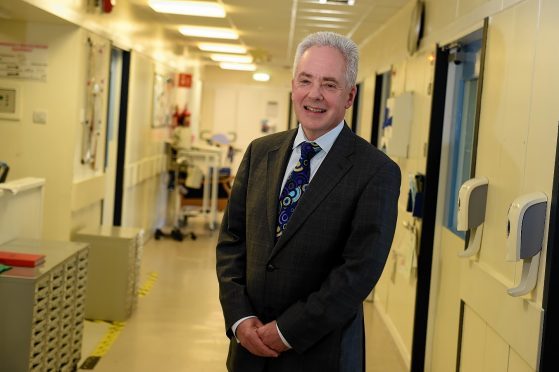A top health boss has admitted there is no end in sight for waiting time delays in the north-east.
NHS Grampian’s chief executive Malcolm Wright said the board everything possible to cut lengthy waiting times for those in need – and revealed specialist services in particular are a “top priority”.
Earlier this year, it emerged the health board’s waiting times were the joint second-worst in Scotland, with nearly one in four patients failing to be seen within the 18-week target set out by the Scottish Government.
One of the worst areas was patients waiting for access to specialist child and adult mental health services.
Mr Wright last night admitted the delays were “not acceptable” and stressed the board was working to improve them.
But when asked if he could assure patients that NHS Grampian would meet the Scottish Government’s target by the end of the year, the chief executive confessed there is no timescale for achieving that 90% goal.
He said: “At the moment we’re not able to meet all those access standards all the time.
“We’re doing everything in our power to attract staff to come and work here, and to improve our processes.
“We don’t like the situation with waiting times either, and we want to do everything we can to mitigate it.”
Just 77.4% of patients in the north-east were seen within the target time according to the March results.
The average for NHS boards across Scotland at the previous count was 83.8% – which is still short of Holyrood’s access standard of 90% of patients.
Mr Wright said one of the main issues surrounding waiting times is the well-publicised lack of staff.
There are currently more than 400 nursing and midwifery vacancies at the health board, and last year NHS Grampian spent more than £1million on locums to cover surgical departments between April and September.
Mr Wright said: “One of the challenges that we face here in the north-east, and we’ve talked about this a lot in the past, is the supply of a trained work force.
“And that is in the context of UK-wide issues, some Scotland-wide issues, and some very particular issues here in the north-east of Scotland.
“This has led us to do a number of things. One is we’re asking how can we make this a really attractive place for people to want to come and live, work, train and have a career.
“And I think we’ve had some considerable success in attracting consultants – the number of consultancy vacancies has reduced and I think that’s hugely welcome.
“We’re also looking at training up band four staff, so there are a number of things we’re looking at locally to try and mitigate some of those challenges.”
And in addition to improving recruitment and retention of permanent staff, Mr Wright said major projects are under way to make the most of the resources available to further cut waiting times.
He said: “We want to make the maximum use of the facilities we have.
“Within operating theatres, for example, we’ve got a major transformational redesign process to make sure that if somebody is called in, they don’t have their operation cancelled, if at all possible.
“We need to make sure we plan ahead proactively to make sure that if a patient comes in, not only is there an operating theatre ready for them but there are staff there from all different
disciplines, and we have a critical care bed, and a ward bed – we’re planning all of this much more proactively than perhaps we had done in the past.
“We’re very much trying to be transparent with our clinicians, with our referring GPs and with our patients that we want to meet the access standards.
“We’re not able to do that in all cases at the moment, and we’re going to make sure that the most urgent patients get treated in order of clinical priority.”
A Scottish Government spokesman previously said: “We have been clear with all health boards that patients who are waiting for treatment such as elective surgery are seen as quickly as possible.
“It is important that patients with the highest clinical priority, such as cancer patients, are seen quickly. NHS Grampian has been in contact with us on this matter and we continue to work with the health board to ensure all patients are seen in a timely manner based on their condition.”
